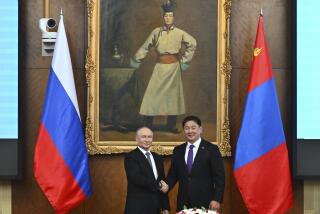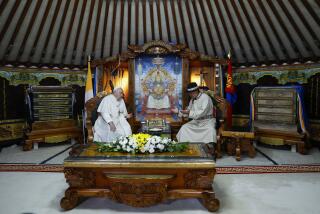Mongolia Bans Rally by Movement Calling for Reforms in Marxist Rule : Far East: Officials say the pro-democracy critics are going too far too fast. But they agree to discuss the nation’s future with them.
- Share via
BEIJING — It began four Sundays ago, when hundreds of demonstrators, braving 30-below-zero winds, carried protest signs urging, “Mongolian Brothers and Sisters, To Your Horses.” The scene was repeated on the following Sundays, drawing thousands more into the frozen streets of the Mongolian capital of Ulan Bator until it climaxed last week when a small street statue of Josef Stalin disappeared and another was vandalized.
That seems to have been a bit too much.
This morning, the Communist world’s most remote experiment in perestroika hit a roadblock as the Soviet-backed regime in Mongolia banned what had promised to be the nation’s biggest Sunday protest against nearly seven decades of Marxist rule.
At the cutting edge of the movement, according to foreign sources reporting from Ulan Bator, is a small group of Mongolian intellectuals and artists calling themselves the Mongolian Democratic Union. The union had won Communist Party permission to hold the earlier Sunday protests and had planned to lead another rally today.
Stressing the ban in an article published Friday in the party journal, Unen, Mongolia’s Communist leaders appealed to the pro-democracy union to “stop and think.” They declared that the union had gone “too far too fast” in calling for reforms in the nation of 2 million, sandwiched between China’s Inner Mongolia region and the Soviet Union’s southern Siberian border.
During last Sunday’s demonstration, which drew an estimated 5,000 protesters and included banners that demanded, “Down With Bureaucracy” and “Speed Up Perestroika, “ speakers for the first time publicly criticized Mongolia’s longtime dictator Yumjaagiyn Tsedenbal, who ruled ruthlessly for more than three decades until he was purged in 1984.
The speakers demanded that Tsedenbal, who was blamed for many executions and purges and is now living in the Soviet Union, be returned to Ulan Bator and put on trial.
The protesters also demanded public debates that would lead to the formation of a full Parliament and a multi-party system in Mongolia, as well as formal investigations into past decades of political and social repression, according to reports reaching Beijing.
“We must increase our efforts to overthrow the present system, which is haunted through and through by the ghost of Stalinism,” one speaker declared, according to an East German news agency that covered last Sunday’s rally.
The East German agency ADN reported Saturday from Ulan Bator that the Mongolian Democratic Union had persuaded the government to hold talks with it this Monday and Tuesday on the country’s future.
Mongolia has been a virtual Soviet satellite since the Communists took over in 1921 and changed the name of the capital to Ulan Bator, which means “Red Hero” in the Mongolian language. It is the second-oldest Communist nation in the world after the Soviet Union. Most foreign residents in the capital have termed the recent protest movement startling.
The movement appeared to have the sanction of Mongolia’s reformist leader, Jambyn Batmonh, and the ruling Mongolian Communist Party, which declared at its annual plenum last month that reforms are needed if the party is to remain the “political vanguard” of the nation.
Even before the Democratic Union launched its protest in mid-December, there had been other strong signs of growing reformist and nationalist sentiment in the capital city of 500,000 people.
Mongolia’s official press was increasingly open in its criticism of the party. There was a formal movement to tear down not only the statues of Stalin, but also that of the brutal Mongolian autocrat, Khorloin Choibalsan, a Stalinist ruler whom Batmonh himself has accused of killing thousands of opponents and Buddhist monks during a 1930s purge.
But much of the Mongolian push toward reform and national revivalism used as its focus Mongolia’s best-known favorite son, Genghis Khan.
For decades, that name was unmentionable in public, despite the fact that Genghis Khan was largely responsible for the creation of the first Mongolian nation in the early 13th Century. He did so, in part, by killing thousands of Russians. Mongolian writers have noted that, in decades past, officials have been expelled from the Mongolian Communist Party just for describing Genghis Khan’s exploits accurately.
In recent months, though, the national press has begun venerating Genghis Khan as the nation’s founding father and its first and greatest hero. And, in a gesture that most analysts viewed as deeply symbolic, the government announced last year that Ulan Bator’s first luxury hotel, due to open next year, will be proudly named the Genghis Khan Hotel.
Against that backdrop, it remained unclear how Mongolia’s pro-democracy leaders will react to the ban on today’s rally and the recent warnings by the Communist Party. But few are expecting a Romania-style revolution.
More to Read
Sign up for Essential California
The most important California stories and recommendations in your inbox every morning.
You may occasionally receive promotional content from the Los Angeles Times.













